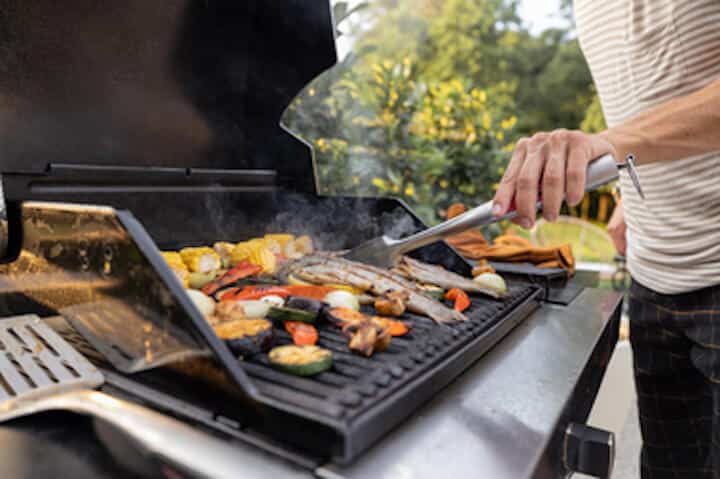When selecting a gas grill, start with the configuration: Do you want a built-in grill or one that’s free-standing? Natural gas or propane? Both fuels cook similarly, so your decision should come down to availability and convenience.
Grill size is next. How much cooking surface is available? Larger grills include more main burners. You can always turn off a burner or two, but you can’t make your cooking surface larger.
It sounds like we’re talking to grillers in Colorado or New Mexico — people with large acreage who grill all the time. But people who live in cities also enjoy grilling in their small backyards or even on their balconies or terraces. So what should grillers be looking for? Experts say that you should look for a grill that costs from $400 to $900 for the best value. It can last a decade or more.
A dependable grill with simple controls will deliver consistent results each time you cook. When fresh air and the aroma from a juicy grilled burger combine, we’re talking warm-weather delight.
You’ll want a gas grill that is durable, easy to clean and simple to control: usability, durability and value. You’ll want meat that’s deeply seared and evenly cooked. You’ll also want a compact-sized grill that suits any patio or deck. A three-burner grilling surface is big enough to cook a complete meal — meat, fish and veggies — for a family or a dozen burgers for a party.
Look for a grill that guarantees all parts for a full decade. You’ll want an under-grill storage shelf and an external mount that makes it easy to change out the propane tank and one that’s simple to assemble, maintain and use. A grill that’s under $700 and does all that is a terrific value.
Consider the extras
If you’re more of an everyday griller who entertains a lot, you can upgrade to a grill with a larger grilling area with more heat per square inch. The main grate can have a 20% larger cooking area and maybe an extra burner for searing.
You’ll probably want roomy side tables to put the food on until it is brought to the table. What about an expandable warming rack with bars that run front to back instead of side to side? It makes it easier to slide a spatula under the food.
Look for four casters for easy mobility. Now let’s take it down a step — how about a smaller two-burner version with enameled steel throughout, porcelain cast-iron grates and an open-cart design with a side mount for a propane tank? It offers enough space for a whole cut-up chicken or six to eight burger patties.
Always check the warranty before you purchase. Grills with a long-lasting warranty from brands with good customer service mean that should any part fail and need to be replaced, it will be taken care of.
Where do you plan to place the grill? Natural gas and propane grills have different requirements for grill ventilation. While most gas grills have a thermometer built into the lid, don’t fully rely on it. They’re fine for getting a rough idea of how hot your grill is, but being that they’re several inches above the cooking grate, they can’t accurately report the temperature on the surface. Consider getting an inexpensive infrared thermometer to gauge the temperature of the cooking grates.
A grill cover is highly recommended to protect the unit during harsh weather and extend its life span. If a grill is the centerpiece of your outdoor entertaining area, you’ll want to find the best grill for your inner chef that matches your cooking style and budget. There are portable models to take camping. And yes, there are iconic grills with cultlike followings, but a good, simple grill that doesn’t leave much of a mess will be a better fit for your outdoor feast. Happy grilling!
